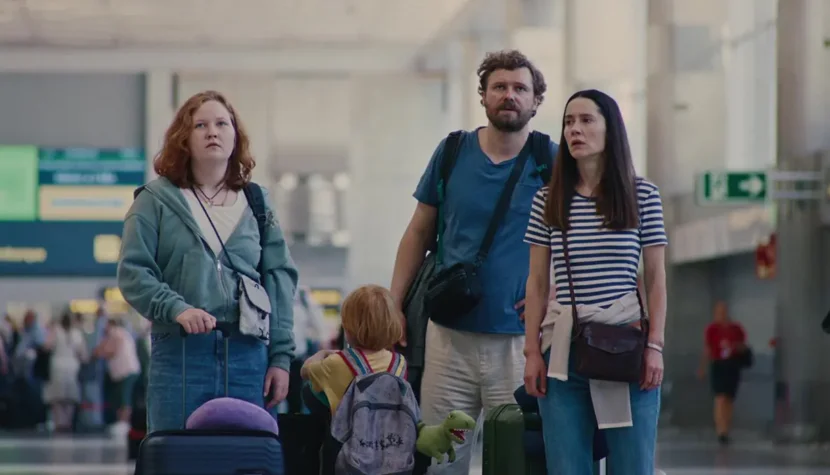UNDER THE VOLCANO: This Is Not a Film About War [REVIEW]

Damian Kocur opens “Under the Volcano” in a subtle yet impressive way. Tenerife, an all-inclusive vacation. Children gather around a hotel animator, who asks each of them for their name and country of origin. The group, typical for a vacation setting, is diverse. There are young Dutch, Germans, and English kids, and even someone from Poland. The last to introduce himself is Fedir. When asked where he’s from, he shyly answers, “Ukraine.” Moments later, the children immerse themselves in carefree play. The national divisions that had been highlighted vanish, and the universal language becomes the game of tag. In the first shot of “Under the Volcano”, Kocur presents us with a utopia, a world without barriers. All this, only to shatter the foundations of that world a few scenes later with the news of Russia’s full-scale invasion of Ukraine.
“This is not a film about war”—I heard this from everyone I spoke to after the screening of “Under the Volcano”. And indeed, the outbreak of war is, at least at first glance, merely a catalyst for the narrative events. A Ukrainian upper-middle-class family decides to stay in Tenerife a few extra days—flights have been canceled, and the situation back home is more than unstable. At this point, Kocur sharpens his focus and activates his observer mode. He discreetly shows how the relationships between the family members become increasingly tense. The relaxed, holiday atmosphere evaporates in an instant. Unspoken conflicts surface—between the stepmother and stepdaughter, between husband and wife. Everyone blames each other for their inaction, their passivity in the face of their homeland burning. In such a situation, provoking a fight in the hotel dining room or stalking Russian tourists staying at the same hotel as the protagonists becomes a symbolic act of revenge. Anything to do something, to react somehow, and feel even a bit more righteous.

“Under the Volcano” is thus a film about the war in Ukraine in the same way that “The Zone of Interest” is a film about the Holocaust. Like Glazer, Kocur uses the proven strategy of not showing. The horror of what’s happening hundreds of kilometers to the east is conveyed through fragments of information that reach the characters “trapped” in Tenerife. Short video chats that teenage Sofia has with her friends in Kyiv. A message from her brother, who, driven by patriotic duty, has joined the territorial defense forces. The characters play a peculiar game with themselves: they try to enjoy their extended vacation, touring the island as if nothing has happened. Yet the specter of war robs them of any joy, leading to internal frustrations—the first to notice this is Sofia. She unmasks the “composed” adults: she provokes her stepmother into saying too much, and she spies on her father crying in the bathroom. The film is dominated by this young girl’s perspective—she organizes the narrative, introducing several intriguing subplots along the way.
In terms of poetics, Kocur remains an incredibly consistent filmmaker. He continues to work with non-professional actors and achieves astonishing results—there is no other Polish director right now who can extract more from non-professionals (Krzysztof Skonieczny tries but with rather poor results). He also continues to blur the lines between what is staged and what is improvised. Kocur’s scripts are only a few dozen pages long, written in continuous prose. Most of the dialogue emerges on set—the actors play under their real names and speak in their own words in front of the camera. This approach allows Kocur to capture several gem-like scenes. A debate about whether Leonardo DiCaprio or Brad Pitt starred in “Titanic” suddenly becomes a starting point for reflections on the individual experience of cinema. As Mike, a Black character, states, he and Sofia watched the same movie but through different eyes. Or another conversation, right before the end of the film. A father and daughter are drinking beer together. They start with an innocent discussion about music and end with existential musings about the future. For a moment, the generational gap disappears—something magical is born between the characters. A genuine connection.

I’m writing this review at a time when we already know that “Under the Volcano” has become our official candidate for this year’s Oscar race. Is it a good choice? Probably, given its quality, theme, and the fact that the film had its world premiere at the Toronto International Film Festival. It didn’t make a huge splash there, but it registered in the minds of overseas viewers. I’m also writing this after the Golden Lions were awarded at the Gdynia Film Festival—”Under the Volcano” only won one statuette, for best acting debut. So, history has repeated itself, just like with “Bread and Salt”. Kocur’s film once again flew under the radar—underrated, practically overlooked by the jury. It’s a shame because this is a work that deserves recognition. It positions itself somewhere between early Östlund and the later Dardenne brothers. A cinema of small observations but great emotions.

